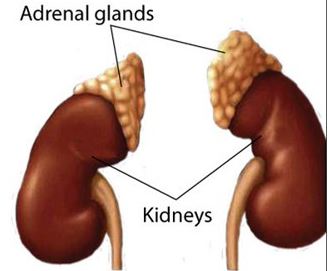Adrenal Glands
What is the Adrenal gland?
The adrenal gland or the suprarenal gland is a part of the endocrine system responsible for secreting hormones for stress and other body functions. The adrenal glands have different shapes. The left adrenal gland is semilunar in shape while the right adrenal gland is triangular shaped. The adrenal gland is a small gland one-third the size of a normal kidney.
The adrenal gland is supplied by blood by the superior, middle and inferior renal arteries. The venous blood is drained into the right and left suprarenal veins. The adrenal glands together with the thyroid gland are the top two organs that receive the most blood per gram of tissue.

Adrenal Glands is located at the top of kidenys
Image source: riversideonline.com
Adrenal gland Location
The adrenal glands are located on the top of each kidney in the retroperitoneum. It is termed as suprarenal gland because it is situated on the top of each kidney. In humans, the adrenal glands are surrounded by the renal fascia and adipose tissues. The adrenal glands are found on the level of the 12th thoracic vertebrae.
The adrenal glands are divided into parts: the adrenal medulla and the adrenal cortex. Both structures in the adrenal gland have definite functions and hormones to produce.
Adrenal Gland Hormones and Functions
The adrenal gland secretes various hormones needed in the body such as:
Hormones secreted by the adrenal cortex
Glucocorticoid
The adrenal cortex secretes cortisol, corticosterone, and deoxycorticosterone responsible for the utilization of fats, proteins and carbohydrates in the body. It is also responsible for anti-inflammatory effects in the body.
Mineralocorticoid
Mineralocorticoid is secreted in the form of aldosterone. Aldosterone serves as a regulator in the body because it regulates salt and water in the kidneys. When aldosterone is increased, there is more sodium and water retention in the body. Because of sodium and water control, aldosterone is directly responsible for the regulation of blood pressure.
Androgens
The adrenal cortex also secretes androstenedione and dehydroepiandrosterone, which are precursors for the production of sex hormones especially testosterone.
Hormones secreted by the adrenal medulla
Epinephrine
Epinephrine or adrenaline is responsible for the fight and flight response of the body. It is responsible for adapting to stress. Epinephrine is responsible for the increase in the heart rate, respirations, metabolic rate and muscle contraction during stress. It also delays muscle fatigue to enable to face the stressor. When people are under stress, the bladder and the colon are less stimulated leading to urinary retention and constipation.
Norepinephrine
Norepinephrine or noradrenaline is also similar to epinephrine in action. It causes constriction of the blood vessels leading to an increase in blood pressure. It also increases the heart rate and improves coronary blood flow.
Adrenal Gland Disorders
Deficiency and overproduction in the hormones secreted by the adrenal gland lead to problems in the body. Certain disorders in the adrenal gland may include:
Cushing’s syndrome
Cushing’s syndrome is a condition wherein there is an increase in the production of cortisol. Because of this, there is an excessive cortisol that the body doesn’t need leading to problems such as hypertension, edema, abnormal fat distribution, increased susceptibility to infection, poor wound healing, and decreased resistance to stress because of too much cortisol in the body. Cushing’s disease often results from adrenal hyperplasia, adrenal tumor or exogenous administration of steroids leading to increased in amounts in the body.

Cushing Syndrome as one of the disorders of adrenal glands
Adrenal gland tumors
Adrenal gland tumors may also arise as a result of primary or secondary malignancy. Primary tumors initially arise in the adrenal gland while secondary tumors may arise from metastasis from other areas in the body such as the lungs. The presence of adrenal tumors leads to hyperfunctioning similar to Cushing’s disease.
Adrenal Gland Failure
Adrenal gland failure is also termed as Addison’s disease. This leads to the hypofunctioning of the adrenal cortex. Because of this, there is limited secretion of mineralocorticoids, glucocorticoids and androgens. Addison’s disease is considered idiopathic or there is no known cause. Deficiency in the mineralocorticoids leads to poor regulation of salt and water leading to increase in water excretion. Glucocorticoid deficiency leads to decreased gluconeogenesis and increased in the production of melanocyte stimulating hormone by the pituitary gland.
Adrenal Failure Symptoms
Symptoms of adrenal failure result from the reduction in the secretion of the steroids in the body. These include:
- Fatigue – A reduction in the production of steroids may also affect the production of epinephrine. The reduced reaction to stress leads to fatigue.
- Weight loss – Low levels of aldosterone also promote water loss from the body leading to rapid weight loss.
- Hypoglycemia – Cortisol is responsible for gluconeogenesis. When the levels are low, it leads to poor metabolism of carbohydrates, fats and proteins that further leads to low blood sugar levels.
- Dehydration – As a result of water loss from the body, the extracellular volume is depleted leading to dehydration.
- Hyperkalemia – The potassium level also increases because of a decrease in the sodium levels in the body. Hyperkalemia further leads to cardiac arrhythmias.
- Postural hypotension – The volume depletion reduces the vascular tone leading to low blood pressure.
- Bronzed skin – The low levels of cortisol also fail to inhibit the adrenocorticotropic hormone produced by the pituitary gland, which increases the melanocyte stimulating hormone. As a result, there is increased production of melanin.
- Decreased resistance to stress – There will also be decreased resistance to stress because of reduced epinephrine and norepinephrine production.
Causes of Adrenal Failure
The exact cause of adrenal failure is unknown, but the presence of congenital hypoplasia of the adrenal gland, pituitary tumors and management of Cushing’s syndrome may cause the condition.
Treatment of Adrenal Failure
The main treatment of adrenal insufficiency is to replace the adrenal hormones that are lacking. Treatments include:
Corticosteroid Therapy
Exogenous corticosteroids are usually given to provide the body with the lacking cortisol in the body and reverse the symptoms. However, corticosteroid therapy should be carefully tapered to prevent life-threatening crisis when the treatment is stopped.
Intravenous Glucose Administration
Hypoglycemia may be treated with intravenous glucose therapy to prevent severe hypoxia of the brain cells.
Intravenous Infusions
Intravenous fluid infusions are also given to maintain vascular integrity and prevent severe dehydration. Increasing the fluids also reverses hypotension as a result of loss of intravascular volume.